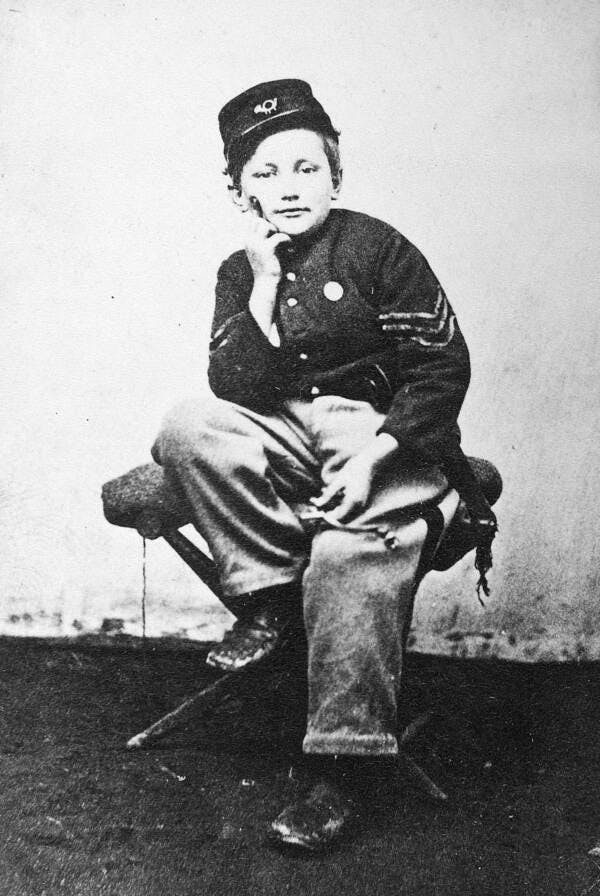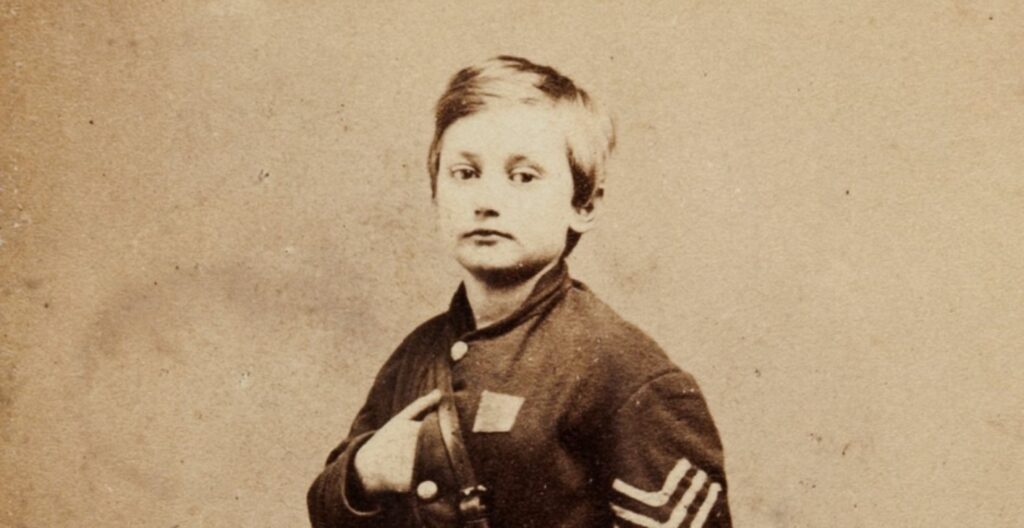THE STORY OF JOHN LINCOLN CLEM, CIVIL WAR CHILD SOLDIER
In 1861, a determined 9-year-old boy named John Lincoln Clem set out to join the Union Army, only to be initially rejected for being too small and young. But Clem, who stood just 4 feet tall, persisted and eventually became the drummer boy for the 22nd Michigan Infantry at the age of 10. This marked the start of Clem’s incredible journey from child soldier to promoted sergeant after heroics in battle at age 12.


regiment to adopt him as their unofficial mascot and drummer boy.
A CHILDHOOD CUT SHORT
John Clem’s path to the army started with tragedy. In 1861, when Clem was just 9 years old, his mother died in a train accident back home in Newark, Ohio. Soon after, Clem made his first attempt to enlist with the 3rd Ohio Infantry, promising he could carry a gun if it wasn’t too heavy. The officers turned him away, but Clem was undeterred.
After pestering the 22nd Michigan Infantry, their colonel finally relented, allowing Clem to tag along as the regiment’s drummer boy. While not an official enlisted soldier, the officers provided Clem a salary of $13 per month out of their own wages. Now known as “Little Johnny Clem,” the 10-year-old found himself headed to war.
Clem was one of thousands of child soldiers who served in the Civil War, despite age requirements. While some stayed back from battles as drummers or messengers, many underage boys like Clem saw combat on the frontlines. The chaos of war swept up children and teenagers eager to join the fight. For Clem, his first test would come at the Battle of Chickamauga.
THE DRUMMER BOY OF CHICKAMAUGA
In September 1863, Clem experienced the horrors of war firsthand at the Battle of Chickamauga in Georgia. The bloodiest battle in the Western Theater, Chickamauga left over 16,000 Union casualties.
As Clem’s regiment retreated, he became separated and cornered by a Confederate officer. Amused by the tiny 12-year-old with a sawed-off musket, the officer laughed and told Clem to surrender. But Clem stood his ground. Refusing to give up, he raised his musket and shot the officer before fleeing to safety
For his bravery, Clem was promoted to sergeant on the spot, making him the youngest non-commissioned officer in U.S. Army history. His heroics also earned him the nickname “Drummer Boy of Chickamauga.” Clem’s story provided a rare bright spot for the Union after their defeat at Chickamauga. Newspapers across the North soon spread the tale of the fearless 12-year-old who shot a Confederate officer.
PRISONER OF WAR
Clem’s legend grew, but his time in combat was short-lived. Just weeks after Chickamauga, Confederate troops captured Clem while he was on guard duty. After three days as a POW, Clem was freed in a prisoner exchange and sent back north.
Upon returning to his regiment, Clem met with General William Rosecrans who had been relieved of command after Chickamauga. Impressed by Clem, the general shared his story with reporters, helping catapult the young soldier to nationwide fame. For the Union, Clem’s bravery and resilience in battle uplifted morale.
Brady-Handy photograph collection.
DISCHARGED BUT NOT DONE
By 1864, the war was taking a toll on the 13-year-old Clem. With new regulations against child soldiers, an officer formally discharged Clem from service that year. He enrolled in school at the army’s urging, determined to further his education.
Yet while Clem attended school, he stayed in touch with his regiment, hoping to return. “Please tell my Colonel to write to me as soon as he can,” Clem wrote to a friend. “If any of the officers are willing to write to me I would be very much pleased to hear from them.”
Clem graduated high school in 1870, but at heart he remained a military man. Just one year later, with the help of President Ulysses S. Grant, Clem realized his dream and reenlisted in the U.S. Army.
LIFELONG MILITARY CAREER
In 1871, Grant appointed the eager 19-year-old Clem as a 2nd Lieutenant. Thus began Clem’s lifelong career in the Army. Stationed at Fort Brown in Texas, Clem fought Native American tribes and outlaws. He served in the Spanish-American War and gradually climbed the ranks, retiring in 1915 as the last active Civil War veteran.
In 1916, Clem was promoted to Major General, in honor of his courage as a 12-year-old drummer boy over 50 years prior. After a distinguished military career spanning 44 years, Clem passed away in 1937 at age 85. He was laid to rest at Arlington National Cemetery.
THE LITTLE DRUMMER BOY
John Clem’s remarkable journey from rejected child volunteer to decorated Major General seems almost unbelievable. But Clem’s youthful determination helped him overcome adversity and dangers on the battlefield.
While Clem’s experience highlights the controversial use of child soldiers, it also shows the best of human spirit – a boy who stood up in the face of fear and impossible odds. Thanks to his unrelenting grit both as a child and through adulthood, John Lincoln Clem left an enduring mark on American history.
📈😲Additional Facts
34,000+
The battle of Chickamauga in 1863 where John Clem was a drummer boy was the second bloodiest battle after the battle of Gettysburg. The Union army had casualties of over 16,000 while the Confederates lost over 18,000. Total casualties were 34,624.
100,000+
With over 2 million Union soldiers twenty-one or younger and around 100,000 just fifteen or younger, armies were overwhelmingly youthful. Thousands under eighteen flooded to battle, separating from families and facing trauma. Though mostly in drum corps, their exposure to deprivation and danger left an indelible mark.

